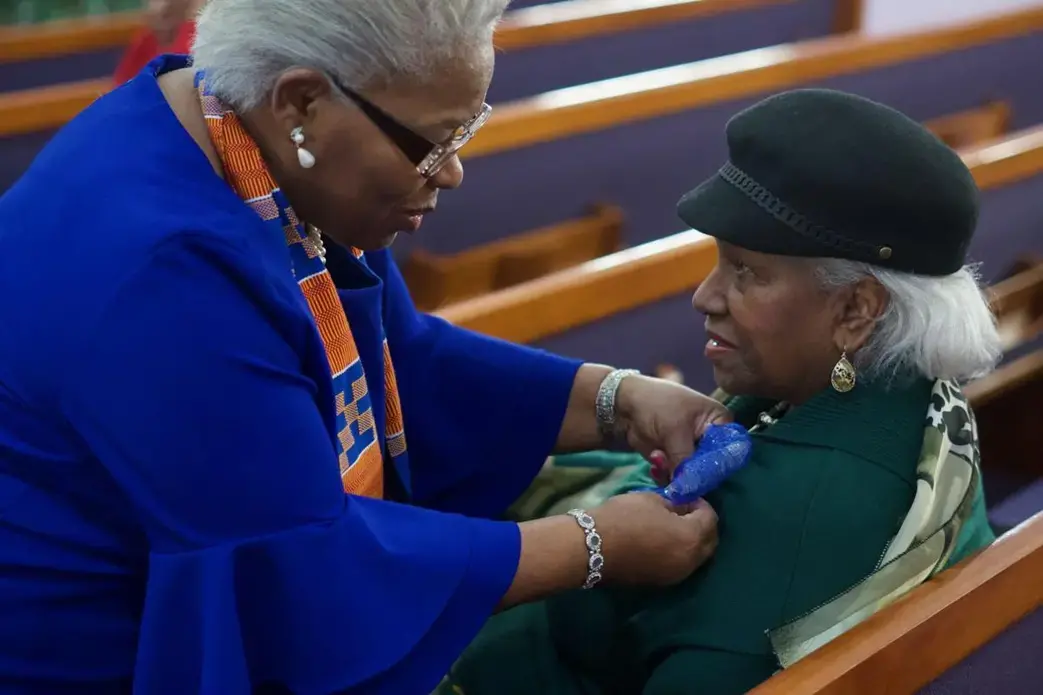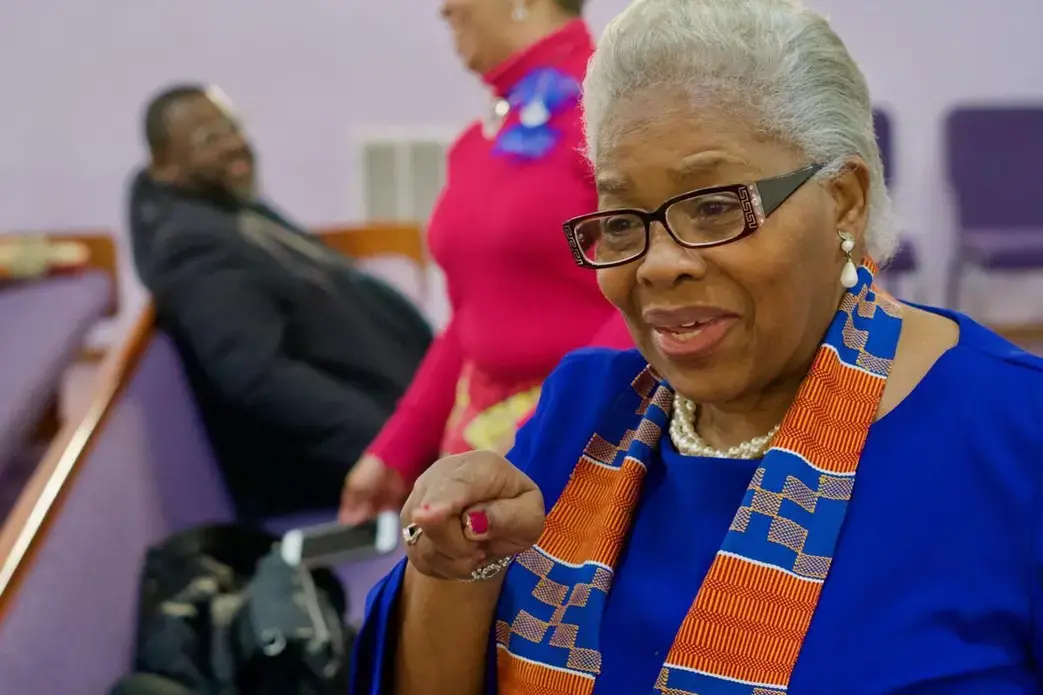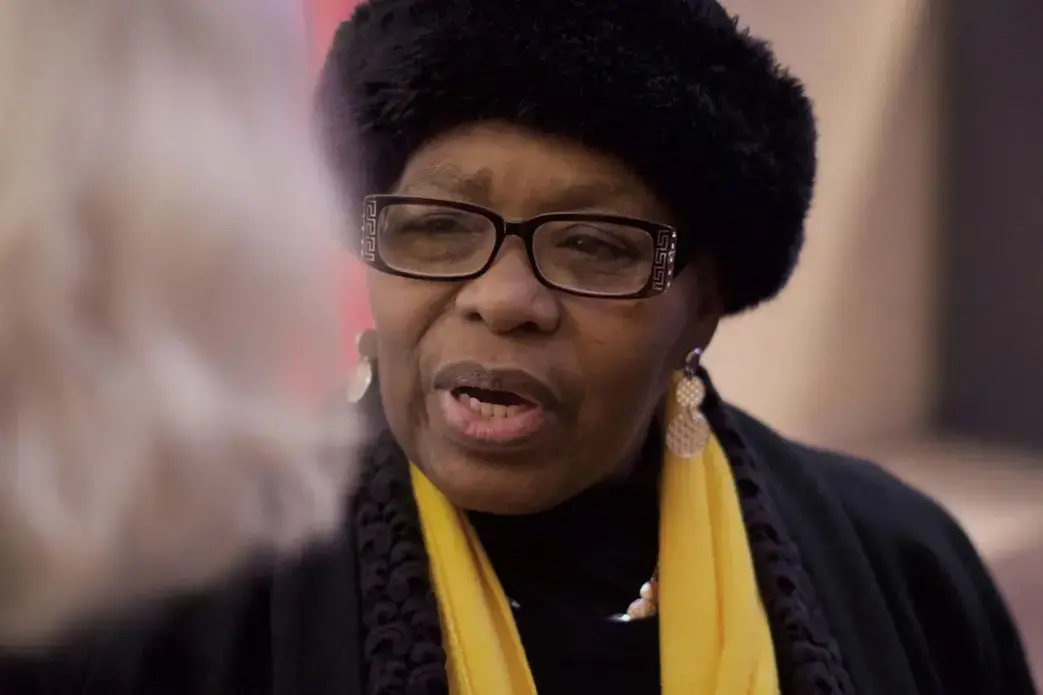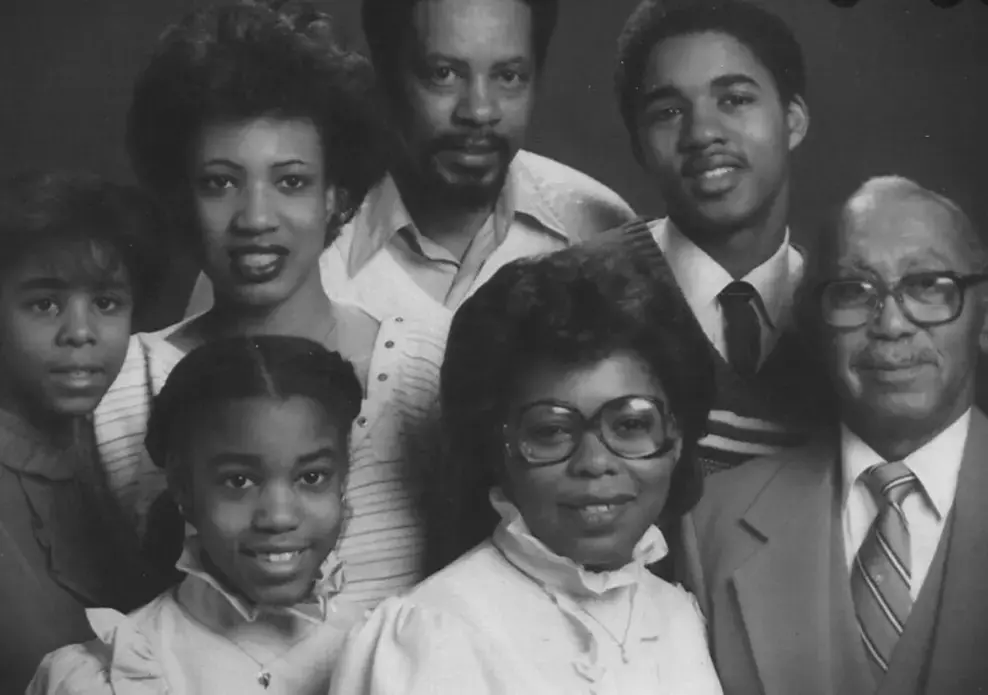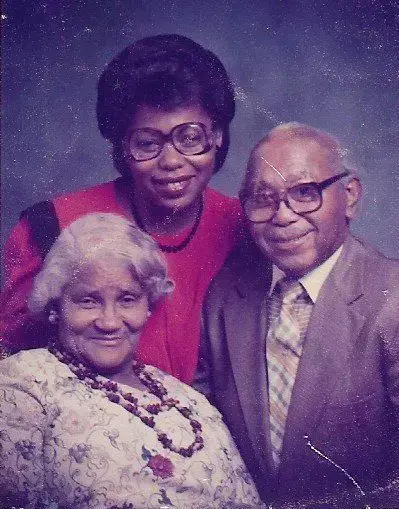At age 73, and as a nearly lifelong resident, Joyce Elliott knows Alton’s stories. Now, surely, she has become one of them.
History books will record that Joyce Elliott was the first female licensed ordained minister at Union Baptist Church, the oldest African American church in Illinois. That happened 20 years ago. Elliott also has served as an educator, civil rights activist, community leader, social service worker, poet and encourager. Most of her life has been spent on that last effort. Often the person she had to encourage the most was herself.
Before stepping into her ministry, Elliott’s faith was tested repeatedly. First, in early childhood when she was separated from her mother. Then as a teenager when she was raped by a friend’s brother. Then a few years later when, distraught over a pregnancy, she attempted suicide. Once, coming even closer to tragedy, she fired a shotgun at her unfaithful and unreliable partner.
That partner, Linwood Elliott, survived. Tapping into her faith, Elliott forgave him and later married him. Now divorced, the two remain on good terms. She has also forgiven those who refused to take seriously her ambitions to become a minister or who insisted, as her father had, that she hide her light under a bushel. She even found it in her heart to forgive the rapist.
After becoming a minister, Joyce Elliott would tell her flock: “You’ve got to learn from your past, but don’t live in it.”
As a woman of faith, Elliott knows, too, the importance of celebrating divinely inspired events. In 1991, she pioneered Alton’s commemoration of Juneteenth. It’s the day — June 19, 1865 — when a Union general arrived in Galveston, Texas, to inform enslaved African Americans of their freedom, putting into effect the Emancipation Proclamation. The 30th iteration of Alton’s celebration will be held from 10 a.m. to 5 p.m. Saturday at James H. Killion Park, which was named for a late African American community leader and union organizer.
Family tree
Elliott comes from a long line of women who sustained themselves through faith. Their framed images line the walls of the three-bedroom home where she has lived for more than 50 years. Most prominent is Amanda Branch Jones, Elliott’s great-grandmother. Hers was the first generation of the family to be “born free.” Jones was born in November 1863 — 11 months after Lincoln signed the Emancipation Proclamation.
Amanda picked and chopped cotton, dragging heavy cloth sacks through the fields and coming home to prepare meals on a wood-burning stove that sat on a dirt floor. After her family went to bed, she spent hours by the dim light of a kerosene lamp, piecing together quilts to keep her family warm in the winter. She died at age 99 in 1963 in Holly Grove, Arkansas.
Amanda’s granddaughter — Elliott’s mother — Earnese Branch, was born in Holly Grove in 1915. At 15, Earnese met Arthur Henderson at a summer dance. Arthur was 24, and neither had more than an eighth-grade education. Earnese said yes because marriage was a pass to get away from her childhood. But she didn’t go far. They moved in with Arthur’s parents in the town of Humphrey just 40 miles west.
Their first child was born 10 months later, and over the next 21 years, there were 10 more.
Elliott was the couple’s seventh child, born in the “Negro ward” in the basement of St. Joseph’s Hospital in Alton. Growing up wanting more than others expected of her, Elliott had to fight for everything. Her high school guidance counselor told her she wasn’t college material. Her father told her to aspire to no more than a good job and marrying a man with a paycheck. At 4 foot, 11 inches, she was told she was too short for a manufacturing job and the military.
Elliott was told a lot of things, but she didn’t believe any of them.
Take one, take all
In the 1940s, it was difficult for Elliott’s father to find work in the South. Arthur Henderson moved his family from Arkansas to Alton in 1942, and found a job with Laclede Steel Co. Eight years later, they moved to Michigan City, Indiana, for a better job with Pullman-Standard, which made railroad cars. By then Earnese and Arthur had eight children.
Earnese disliked the brutal winters on the south side of Lake Michigan. But what hurt more was the state of her marriage.
Elliott was 6 when she saw her father knock out her mother’s tooth during an argument. Even then, she remembered thinking no man would ever hit her and get away with it. Although her mother had been hit before, this time was enough for her to pack up the children and insist that Arthur return her to Arkansas to be near family.
Back in Arkansas the children slept two to a twin bed in a two-bedroom house with no electricity nor indoor plumbing. Earnese found work as a domestic for white families, ironing their clothes, cooking their meals and taking care of their children while her eldest daughter cared for hers.
Two years later, in the summer of 1956, Elliott’s father came to visit. Her older sister, Betty, had written asking him to take her back to Alton so she wouldn’t have to care for her younger siblings. Elliott overheard a conversation between her parents. Earnese said, “You take one, you take all of them.”
And that’s what he did, promising to bring them back in August before school started. It was a promise never kept. Elliott was 8 years old and remembers crying for her mother at night. It was four years before she saw her again, when her mother visited Alton for the funeral of her son, Billie, 25.
“I remember holding onto her and not wanting to let go,” Elliott said. “Even then I wanted to go back with her but the answer was always, ‘No.’”
More than 20 years passed before she asked her mother the question she always wanted answered: Why didn’t she come back to get them?
Her mother said she loved them all, that she knew their father loved them too, and that he could give them a better life than she could.
Forgiveness
Life was different for Elliott and her siblings in Alton. They were the third African American family to move into a new segregated housing project, the John J. Sullivan Homes, built in 1954-1955. Spread out in a four-bedroom apartment, they thought they had it made.
“We thought we were in hog heaven because we had all this space,” she recalled. “But me being who I was, I still wanted my momma.”
Every parent was a parent to every child in Sullivan homes, and that made a difference to Elliott. She also found women at Allen Chapel African Methodist Episcopal Church who were more than willing to mentor her.
One of those was Josephine Marley Wilson Beckwith, a civil rights activist who hosted Thurgood Marshall as he was preparing for the Brown vs. Board of Education landmark desegregation case in 1954.
“She always had me doing things that I would never have attempted to do,” Elliott said. “She was the force that pulled it all out. She and Mrs. Hazel Killion made me do speeches. They groomed me for public speaking.”
Elliott enrolled at Central School in Alton as a third grader, and had a Black teacher, Mrs. Edith Brewer. That was in 1956; Alton schools weren’t desegregated for another three years. She appreciated being taught by women who looked like her.
“Black teachers do teach Black children better than white teachers for the simple reason they live the life,” she said. “They know the values that we need to learn, and they can instill them in us in a way that will last a lifetime.”
Elliott walked to school on the right side of a brick street and always noticed a white girl walking on the left, going to all-white Washington Elementary School. One day the girl dropped her books, and Elliott crossed over to help. They introduced themselves and Elliott and Sheila Curran Darr became friends. Fifty-five years later, they still meet for lunch every month.
“It’s been a beautiful friendship,” Darr said. “Every time we see each other, we hug. We were just two little girls who loved to talk. That’s what made us click.”
An A student, Elliott loved math, English and socializing. Everything interested her.
Boys interested her, but not all that much. She dated a little and trusted too much. That’s how she ended up getting in a car with her best friend’s brother, fresh out of the military. He was headed to a family gathering and asked if she would like to ride along to his uncle’s house.
Not long into the ride, she realized he was headed in the wrong direction. After pulling into a secluded area, he got out of the car and exposed himself. Elliott demanded he take her home. Instead, he raped her.
About six months later, the man died of injuries from a car accident. Because Elliott knew the family, she felt she had to attend his funeral. She learned that while he was in the emergency room, he had repeatedly called out her name. She stood by his casket and forgave him, hugged his family and left. They would never know what happened.
“I had no choice but to forgive him,” she said.
Puzzle pieces fit
Before high school graduation, Joyce Henderson met Linwood Rayford Elliott. At first, she was not that interested. But Linwood persisted, and Joyce remembered her father’s words. Linwood had a good job at the foundry, and a brand new car, a 1966 candy apple red Ford Galaxy. They moved into an apartment together.
Within a couple of years, she was pregnant. Linwood begged her to marry him, but she turned him down; he was not the man of her dreams.
That became even more apparent when she learned that Linwood had impregnated another woman and had secretly married her while still maintaining his relationship with Joyce.
Alton is a small town and the public humiliation was devastating. On the day she found out Linwood was married, and at five months pregnant, Joyce stuffed their apartment windows with rags, blew out the stove’s pilot light, turned on the gas, and crawled into bed.
She refused to answer the telephone as it rang. The apartment was filling with the smell of gas. She heard banging on the front door. It was Linwood’s brother, James, who was able to break in. He pulled her out, telling her to live for her unborn child and herself. He said his brother was not worth dying for.
And that’s when her faith reappeared.
“I always cried out to God, asking, ‘Why am I going through this? I’m a good person.’ As I got older, I saw why,” she said. “All these years later, I see how the puzzle fits together. I see why all these people were in my life.”
Linwood returned a few days later, assuring her that he didn’t love the other woman and was determined to be with Joyce only. Although confused, she stayed in the relationship. The first of their three children, Anthony, was born Oct. 6, 1968. Joyce and Linwood married in 1972.
Boiling over
By 1969, Elliott was working in health services at Southern Illinois University Edwardsville — the first African American in the medical records department. The job gave her the stability she needed to buy her first home for $15,000. Her uncle gave her a loan, and the house at 938 Riley Avenue, the one she’d admired since she was 15, became hers. It is just a few blocks from the housing project where she grew up.
Reluctantly, she allowed Linwood to move in. There were some good years, but there were some hard ones too. Especially the late summer evening in 1980 when she was home sick in bed, and their three young children were sleeping. Linwood had left, leaving the front door wide open. Sick, afraid and not quite in her right mind, she decided that was the last time anybody was going to make her feel vulnerable.
She moved to the garage and sat on a wooden church bench for five hours with Linwood’s shotgun, waiting for him to return home. When he did, she stood up, raised the gun and warned Linwood that if he came any closer, it might be his last step.
“Babe, you don’t want to do that,” he told her, “let’s talk” as he took one step, then another, getting close enough to grab the barrel and wrest the gun away from her.
Feeling defeated, she ran inside the house and locked the door. But she was determined he was going to feel some pain that day so she put a pot of water on the stove to boil, with every intention of sending it his way. Then she heard the lock click on the bedroom door. Linwood had climbed through a window. She went to the garage and picked up the gun Linwood had left behind. She took aim at the bedroom door and fired.
The shot did not go unnoticed by neighbors. When a police officer arrived, he found Linwood shaking in the front yard. Joyce knew the officer and explained what happened. He took the gun, suggested to Linwood that he leave for a while to allow his wife to cool off and drove away.
The gospel plow
That Linwood and Joyce could reconcile after that took perhaps more than a leap of faith, but it happened. They still co-parent and grandparent and get together for family events.
For his part, Linwood Elliott said that he and Joyce have never stopped loving each other.
“We still cared for each other, there wasn’t nothing we couldn’t sit down and talk about,” Linwood said. “But we decided we were better apart.” They divorced in 1996.
While one part of Joyce Elliot’s life came apart, another came together. Late in life she was able to reunite with her mother. Earnese watched as her daughter accepted her diploma. And Joyce was able to care for her mother until her dying day.
Through those years without her children, Earnese “kept her hands on the gospel plow,” Elliott wrote in a tribute to her mother after her death in 2008 at age 92.
“I knew Mom was strong by how she treated people. She was good to people who were not necessarily good to her. I learned how to love and forgive people because of my mother. My mom had to have had this extreme faith in God to be able to survive what she went through.”
And it was meant to be passed along.
While preaching during Black History Month at Union Baptist, Elliott asked her flock: “What gift do you have that you’re willing to go all the way to make it work for another generation?” she asked. “Are you determined to make a change, not only in your life, but in the lives of others? We need to leave a legacy that is meaningful. It is so important for us to think beyond ourselves.
“Even during your darkest hour, all you have to do is look up and thank the Lord for a new day of grace, a new day of mercy, a new day that you’ve never seen before,” she said.
“You’ve got to learn from your past, but don’t live in it,” she said. “Move forward without fear.”
Kate Arthur is a freelance journalist and team member of Before Ferguson Beyond Ferguson, a nonprofit racial equity storytelling project. This story is an excerpt from Arthur’s biography of Joyce Elliott that is available as a downloadable PDF at https://beforefergusonbeyondferguson.org/a-new-day-of-grace/. It will soon be available in booklet form for educators and civic organizations.





